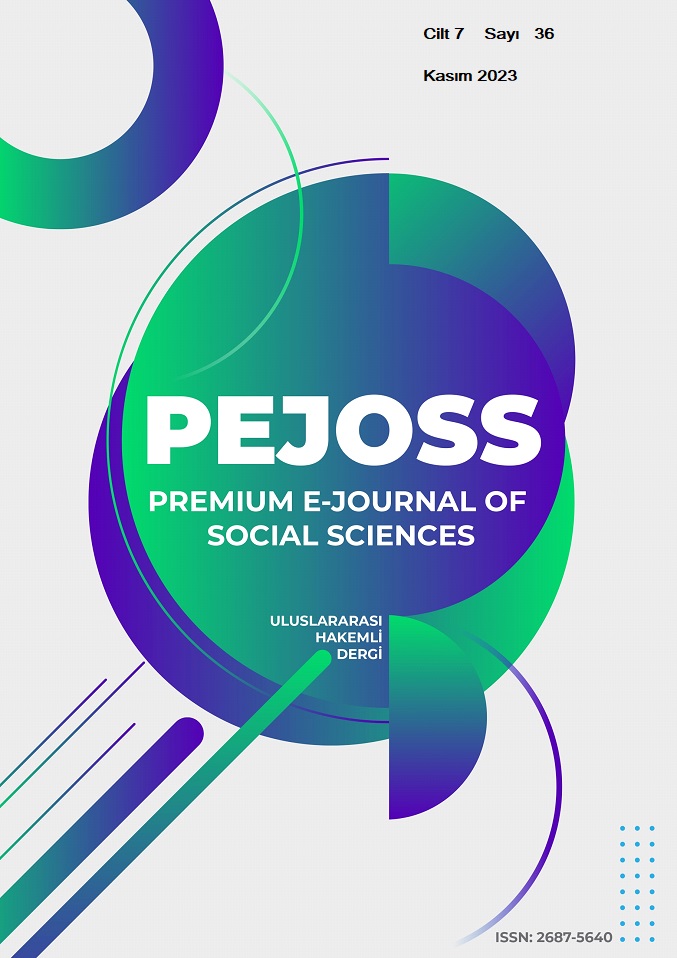Elements Playing a Role in School Management According to School Principals
DOI:
https://doi.org/10.5281/zenodo.10258206Keywords:
school principals, school management, authority sharingAbstract
The subject of this research is the elements that play a role in the management process of school principals and the effects of these elements on management processes. The research was conducted in phenomenological design with a qualitative research method. The study group of the research was formed by 27 school principals determined by stratified purposive sampling method. The data obtained from the school principals were analysed by content analysis and divided into codes in accordance with the themes created. In addition, due to the data security of the participants, the participants were coded according to the type of school they worked in throughout the analysis. The findings of the study show that school principals prefer to share their authority with assistant principals. In addition, school administrators pointed to legal obligations as the reason for these preferences. Another finding of the study is related to the support school principals receive in the management process. According to this finding, school principals receive more support from assistant principals, teachers, parents and auxiliary staff in the management process. In the management style that is in the ideals of school principals, school principals think of sharing their authority with assistant principals, teachers, students and parents. The study showed that school principals do not think of sharing authority with students.
Downloads
References
Aslanargun, E. (2007). Modern eğitim yönetimi anlayışına yönelik eleştiriler ve postmodern eğitim yönetimi. Kuram ve Uygulamada Eğitim Yönetimi, 195-212.
Avcı, A. (2010). Eğitimde şiddet olgusu lise öğrencilerinde şiddet, saldırganlık ve ahlaki tutum ilişkisi Küçükçekmece ilçesi örneği. [Yayımlanmamış Doktora Tezi]. Marmara Üniversitesi, Sosyal Bilimler Enstitüsü, İstanbul.
Aytaç, T. (1999). Okul merkezli yönetim. Eğitim ve Bilim, 23(111), 69-75.
Balay, R. (2004). Küreselleşme, bilgi toplumu ve eğitim. Ankara Üniversitesi Eğitim Bilimleri Fakültesi Dergisi, 37(2), 61-82.
Bursalıoğlu, Z. (2002). Okul yönetiminde yeni yapı ve davranış. Pegema Yayıncılık.
Creswell, J. W., & Creswell, J. D. (2017). Research design: Qualitative, quantitative, and mixed methods approaches. Sage Publications.
Çalık, C. (2007). Okul-çevre ilişkisinin okul geliştirmedeki rolü: Kavramsal bir çözümleme. Gazi Üniversitesi Gazi Eğitim Fakültesi Dergisi, 27(3), 123-139.
Demirtaş, H. (2014). Türk eğitim sistemi ve okul yönetimi. Anı Yayıncılık.
Ergün, M. (2014). Eğitim felsefesi. Pegem Akademi Yayınları.
İnandı, Y. (2014). Okula Toplumsal Katılım. İçinde Sarpkaya, R. (Edt.). Türk eğitim sistemi ve okul yönetimi (ss. 363-392). Anı Yayıncılık.
Kaplan, İ. (2005). Türkiye’de Milli Eğitim İdeolojisi. İletişim Yayınları.
Karatay, Ş. (2011). İlköğretim okulu yöneticilerinin öğretim liderliği davranışları. [Yayınlanmamış Yüksek Lisans Tezi]. Selçuk Üniversitesi, Sosyal Bilimler Enstitüsü, Konya.
Kış, A. (2013). Okul müdürlerinin öğretimsel liderlik davranışlarını gösterme düzeylerine ilişkin yönetici ve öğretmen görüşlerine yönelik bir meta-analiz. [Yayımlanmamış Doktora Tezi]. İnönü Üniversitesi, Eğitim Bilimleri Enstitüsü, Malatya.
Lunenburg, F. C. ve Ornstein, A. C. (2013). Eğitim Yönetimi (Çev. Arastaman, G.). Nobel Yayınları.
Marshall, C., & Rossman, G. B. (2014). Designing Qualitative Research. Sage publications.
Neuman, L. W. (2014). Social Research Methods: Qualitative And Quantitative Approaches (Seventh Ed.). Essex: Pearson Education Limited.
Özdemir, S. (2014). Türk eğitim sistemi ve okul yönetimi (3. Baskı). Pegem Akademi.
Özkeçeci, Ş. B. (2009). Sürekli ve verimli eğitimin bireysel ve toplumsal gelişmeye katkısı. In: 1st Internatıonal Symposium on Sustainable Development, 408-412. Bosnia.
Peker, S. ve İnandı, Y. (2011). Sınıf Yönetimi ile İlgili Kavramlar ve Olgular. İçinde İnandı, Y. (Edt.). Sınıf yönetimi (ss. 1-18). Karahan Kitabevi.
Şahin, S. (2003). Okul merkezli yönetim uygulamaları. Kuram ve Uygulamada Eğitim Yönetimi Dergisi, 9(4), 582-605.
Taymaz, H. (2003). İlköğretim ve ortaöğretim okul müdürleri için okul yönetimi. Pegema Yayıncılık.
TDK (2023). Sözlük. Türk Dil Kurumu. www.tdk.gov.tr.
Yiğit, B. ve Bayrakdar, M. (2006). Okul-çevre ilişkileri. Pegema Yayıncılık
Downloads
Published
How to Cite
Issue
Section
License
Copyright (c) 2023 Premium e-Journal of Social Science (PEJOSS)

This work is licensed under a Creative Commons Attribution 4.0 International License.


